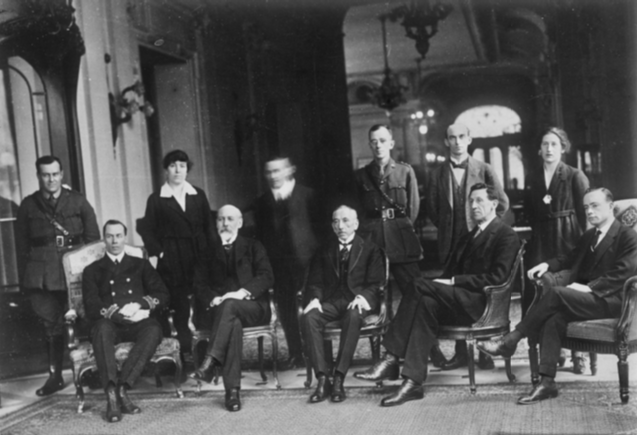
Prime Minister W.M. (Billy) Hughes spent several months in England in 1916 getting to know the wartime decision-makers, attending British cabinet meetings, lobbying for Australia’s trading interests, seeking a greater voice for Australia in future planning, and crisscrossing the country as a public speaker where his vigorous style and independent ideas brought him wide media attention.
In April 1918 he was off again, assuring the governor-general, ‘I am sorrier than I can say to leave Australia. I love this country but I feel it is my duty to go.’ He was away for 16 months. Travelling by way of the United States, where he clashed with Woodrow Wilson over the president’s ‘Fourteen Points’ for peace, Hughes arrived in London in August 1918 to attend the Imperial War Cabinet meetings for dominion prime ministers. As others departed, he stayed on, determined that Australia’s voice would be heard at the Paris Peace Conference.
His immediate priorities were threefold: to represent the case for an independent voice for the dominions in the peace negotiations, to argue for strong reparations for Germany, and to ensure that Germany could never return to its former territories in the Pacific.
Frustrated by Prime Minister David Lloyd George’s exclusion of him from the British War Council’s meeting to discuss peace aims in October, and critical of the Welshman’s readiness to accept Wilson’s memorandum as the basis for discussions on peace, Hughes took his public protest to the Times. In Australia, the view was more constrained. There, his deputy William Watt and the cabinet signalled their view that, while it was essential for Australia to be consulted on peace terms, the country’s best interests ‘should be left in British hands’.
In the event, Hughes stood for Australia at the peace conference in France in February 1919 in a dual capacity, representing a dominion as a delegate of the status of a lesser ally like Belgium, and as an alternate member of the British delegation. In the latter role, he served as one of three representatives for Britain on the Reparations Commission and chaired the subcommittee assigned the task of determining how Germany would be compelled to meet the reparations. He publicly crossed the lofty Wilson in an exchange seen by observers as the ‘little David facing the American Goliath’. Chided later by Wilson in the debate on the German Pacific colonies because Australia represented only a small country of five million people, Hughes replied simply: ‘I speak for 60,000 dead.’ As the story of the confrontations spread around Paris, Hughes became something of a folk hero.
It was, however, as an independent representative that, with support from Canada’s prime minister, Robert Borden, he had his most conspicuous success. Fiercely rejecting all compromise arrangements proffered by the central negotiating powers at the conference (Britain, France, Italy, America and Japan) for the dominions to act in rotation or to be represented by one dominion, or for one only to present on a subject of direct interest to them, Hughes, with Lloyd George’s final consent, established the dominions’ rights to full independent participation.
He was equally intransigent in his demand for settlement of the fate of Germany’s territories in the Pacific. Eager initially for Australian annexation of Papua New Guinea, he accepted the compromise decision for a special mandate giving Japan administrative control of the German islands north of the equator, New Zealand the mandated territory of Samoa, and Australia administrative control (the so-called ‘999 years’) of mandated Papua New Guinea and adjacent islands. He also insisted successfully that the phosphate-rich island of Nauru not be mandated to Britain alone but be jointly controlled by Britain, Australia and New Zealand.
Wary, too, of Japan’s long interest in the Pacific and its possible threat to Australia on questions of immigration and ‘white Australia’, Hughes’s key accomplishment was in blocking Japan’s attempt to secure a clause affirming racial equality in the covenant of the League of Nations.
The Paris Peace Conference was the first major international conference at which Australia was represented independently from Britain. There, impatient of British and foreign opposition, his style spirited and unorthodox, Hughes emerged as a formidable player who took advantage of his principal delegate status to push the Australian barrow.
It was an outstanding culmination of his tenacity in which, as analyst W.J. Hudson concludes, Hughes had ‘taken Australia from almost anonymity in an imperial chorus to a centre-front role on the international stage’, and to a foundation membership of the League of Nations. With the subsequent parliamentary ratification of the Treaty of Versailles in the House of Representatives in late September 1919, Hughes himself recorded, ‘Australia became a nation’.
Hughes left the conference early to join the 1,200 troops returning to Australia on the Friedrichsruh, a former German transport. For the soldiers, he was always ‘the little Digger’, a living symbol of a confident Australia. At London’s Victoria station, a lively crowd of soldiers hoisted his small figure onto their shoulders, crammed an Australian slouch hat on his head, and paraded him down the street.
In his homeland, he received a welcome described as ‘unsurpassed in the history of Australia’. Berthing at Fremantle on 23 August, his arrival set off celebrations that resounded across the country: at Perth and Kalgoorlie and at little wayside stations on the transcontinental line at Port Augusta and Adelaide, and on to Melbourne. Essentially personal, Australia’s response marked the highpoint of William Morris Hughes’s career.

